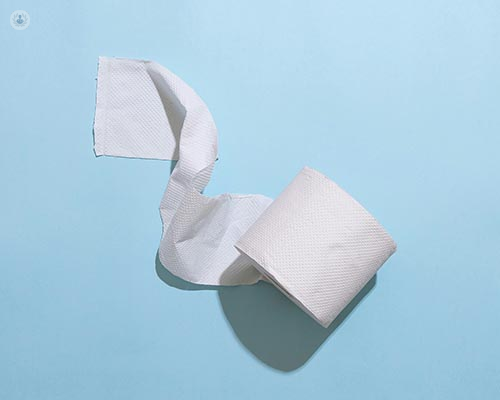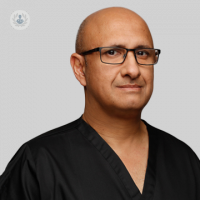Quick-fire questions about anal fissure
Written by:An anal fissure can provoke pain, itching and discomfort, causing interruptions to daily life. Revered consultant colorectal surgeon Mr Tushar Agrawal answers your commonly asked questions about the condition.

What are the common symptoms of an anal fissure?
The predominant symptoms of anal fissure typically include pain, particularly experienced during bowel movements. Patients often describe the sensation as akin to sitting on glass when passing stools. This discomfort may be accompanied by slight bleeding from the rectum, though the primary symptom tends to be the pain felt during defecation.
How is an anal fissure diagnosed?
Typically, clinical examination is the most effective method for diagnosis. A surgeon can visually identify a tear in the lining of the anal canal, usually located in the midline towards the back of the anal canal. This assessment is best conducted by a surgeon.
What are the available treatment options for anal fissures?
The pain generally tends to happen due to the internal sphincter muscle going into spasm. This is a muscle the patient has no control on. The spasm of the muscle not only causes pain but also compromises the blood supply to the fissure if it is in the midline, thereby reducing its ability to heal. The aim of treatment is to reduce the spasm of the muscle.
Regarding treatment options for anal fissures, conservative measures are usually the initial approach. This involves the application of topical creams, which are muscle relaxants aimed at reducing the sphincter muscle spasm. The goal of these creams is to relax the muscles, promoting blood flow to facilitate proper healing.
Patients often experience constipation which can both trigger the fissure and can be a result of the sphincter muscle spasm. Laxatives are prescribed to alleviate this symptom. Additionally, painkillers can be used. Local anaesthetic gels can be used to numb the area, especially during defecation. Dietary advice is given to prevent constipation, which aids in the healing process of the fissure. These measures are typically the first line of treatment.
If patients do not respond to topical creams, the next step is usually Botox injection into the internal anal sphincter muscle. This injection aims to relax the muscle, allowing improved blood flow to the fissure, promoting healing, and relieving pain by reducing the muscle spasm.
In most cases, these interventions are sufficient. Surgical procedures are less commonly used nowadays. The majority of patients respond well to either conservative measures with topical creams or Botox injection.
Do fissures always require medical attention?
No. It is possible for fissures can heal on their own, without medical intervention. Superficial fissures can heal without medical intervention, as long as patients do not strain during defection. However, deeper, chronic or larger ones normally require medical intervention in the form of topic creams.
Are there any dietary or lifestyle changes that can help prevent anal fissures?
The primary cause of anal fissures is straining during defecation. Simple measures such as ensuring an adequate intake of fibre and fluids on a daily basis can make a significant difference in preventing their occurrence. This includes maintaining a diet rich in fibre, staying hydrated, and avoiding prolonged straining on the toilet.
Taking more fibre supplements or the occasional use of laxatives can also be beneficial. It is also important to only use the toilet when necessary and avoid prolonged sitting, without distractions like mobile phones or reading materials. Creating a distraction-free environment during bathroom visits can help prevent not only fissures but also other rectal issues. These small adjustments can greatly aid in the prevention of anal fissures.
If you are suffering from an anal fissure and would like to book a consultation with Mr Agrawal, you can do so by visiting his Top Doctors profile today.


